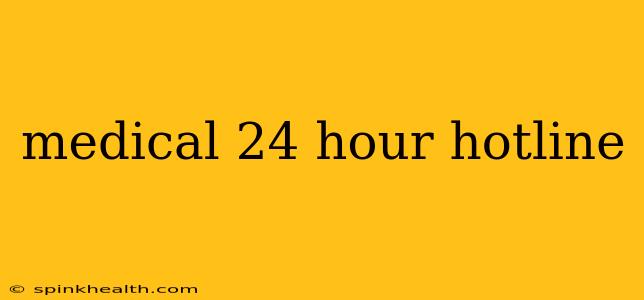Finding Help Fast: Your Guide to 24-Hour Medical Hotlines
Life throws curveballs. Sometimes, those curveballs manifest as unexpected health issues, leaving you scrambling for answers and assistance in the middle of the night or on a weekend. Knowing where to turn for immediate medical advice can be the difference between a minor inconvenience and a major emergency. This guide explores the world of 24-hour medical hotlines, helping you understand when to use them, what to expect, and how to find the right resource for your needs.
What is a 24-Hour Medical Hotline?
A 24-hour medical hotline is a telephone service providing immediate medical advice and guidance, available around the clock, every day of the year. These hotlines are staffed by trained medical professionals—often nurses or paramedics—who can assess your situation, offer advice, and direct you to the appropriate level of care. They're not a replacement for in-person medical care, but they can be a crucial bridge, particularly when access to a doctor or emergency room is difficult or unnecessary.
Think of it like this: you're facing a medical puzzle, and the hotline provides the first few crucial pieces to help you solve it. They can help you understand your symptoms, determine the urgency of your situation, and guide you towards the best course of action.
When Should I Call a 24-Hour Medical Hotline?
This is a question many people ask, and the answer isn't always straightforward. However, here are some situations where a 24-hour medical hotline can be particularly helpful:
- Non-emergency medical concerns: You have a nagging cough that won't go away, a persistent headache, or a minor skin rash. While these might not require a trip to the ER, you want reassurance and advice.
- Medication questions: You're unsure about a dosage, experiencing side effects, or have questions about interactions between medications.
- Post-operative concerns: You've recently had surgery and have questions or concerns about your recovery.
- Mental health support: Some hotlines offer mental health support, providing immediate assistance for those experiencing a crisis.
- Guidance on seeking further care: The hotline can help you decide whether you need to see a doctor, go to urgent care, or visit the emergency room.
Are 24-Hour Medical Hotlines Free?
The cost of using a 24-hour medical hotline varies. Some are free, often provided by government health agencies or non-profit organizations. Others may charge a fee per call or may be covered by your health insurance. It's always best to check with your insurance provider and the hotline itself to understand the associated costs before calling.
What Information Should I Have Ready Before Calling?
Before you call, gather some essential information to expedite the process and ensure the medical professional can best assist you:
- Your age and medical history: Including any pre-existing conditions or allergies.
- A detailed description of your symptoms: When did they start? How severe are they? What makes them better or worse?
- A list of your current medications: Including dosages and frequency.
- Your insurance information: If applicable.
What Happens After I Call?
Once you call, a trained medical professional will assess your situation based on the information you provide. They will ask questions to better understand your symptoms and medical history. Based on this assessment, they will provide advice, recommend self-care measures, or direct you to the appropriate level of care—such as a doctor's appointment, urgent care, or the emergency room. They might also offer reassurance and alleviate any anxiety you might be feeling.
How Can I Find a 24-Hour Medical Hotline in My Area?
Finding a 24-hour medical hotline specific to your region is critical. You can usually find this information by:
- Checking your health insurance provider's website: Many insurance companies list their telehealth services or affiliated hotlines.
- Searching online: A simple Google search for "24-hour medical hotline [your city/state]" will often yield relevant results.
- Contacting your local health department or hospital: They can provide information on available resources in your area.
Remember, while 24-hour medical hotlines are a valuable resource, they are not a replacement for in-person medical care when necessary. Always seek immediate medical attention if you are experiencing a life-threatening emergency. These hotlines are designed to provide guidance, support, and help you navigate your healthcare journey more effectively.

